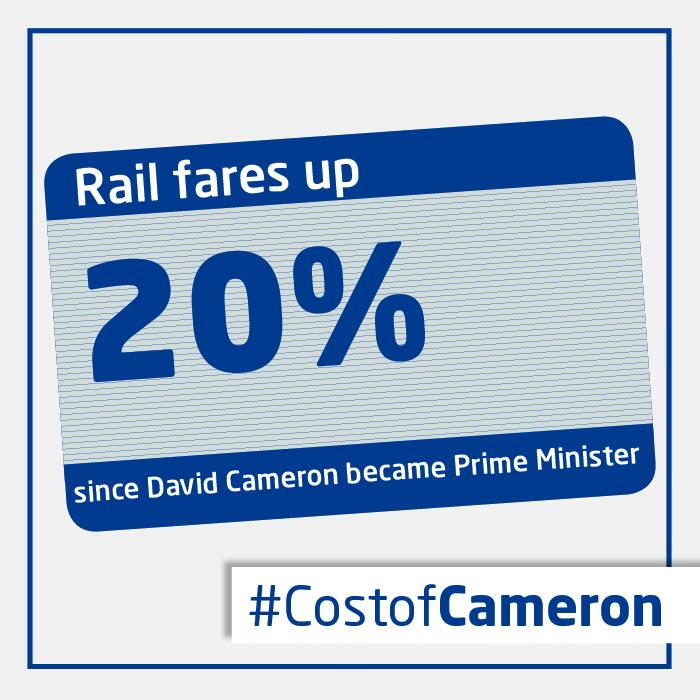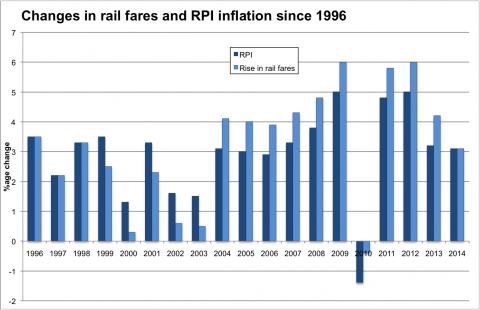Have rail fares risen by 20% since the Coalition took office?
"Rail fares up 20% since David Cameron became Prime Minister."
The Labour Party, 2 January 2014
Commuters heading back to the office for the first working day of 2014 might have noticed lighter wallets to go with the heavier frames some may have acquired through over-indulgence over the festive break, as regulated rail fares increased by an average of 3.1%.
The Labour Party was quick to lay the blame at the door of Number 10 Downing Street, claiming that fares had rised by 20% in the three and a half years since David Cameron (notionally) took up residence there, circulating this graphic on Twitter:

In terms of the cash increase in regulated fares, this is accurate. David Cameron has seen in four new years as Prime Minister, and the combined increase in rail fares that each brought with it has added just over 20% to the nominal cost of a regulated ticket.
| Year | Average increase | Cumulative increase since 2010 |
| 2011 | 5.8% | 5.8% |
| 2012 | 6% | 12.1% |
| 2013 | 4.2% | 16.9% |
| 2014 | 3.1% | 20.5% |
(Source: House of Commons Library analysis of policy announcements)
However this statistic doesn't necessarily reflect the full picture of how rail fares have changed over this period, and nor does it necessarily show that the present government has been responsible for the increase.
Firstly the 20% increase highlighted by Labour is the nominal increase: it doesn't take account of how the value of money has changed over the same time due to inflation. As Labour has itself pointed out in different circumstances before, putting the increase in real terms can dramatically change the overall picture, and in this instance the real terms increase in rail fares since 2010 is closer to 11% (using the Treasury's GDP deflators).
The increase highlighted by Labour also only applies to a certain types of tickets: those subject to regulated fare increases. Regulated fares are those that were set aside after privatisation for the government to oversee. They include most standard and saver return fares, as well as season tickets. They also tend to apply to London and major city commuter routes as they carry the most passengers.
According to the House of Commons Library, only around 45% of rail fares fall into the 'regulated' category. This means that Labour's 20% increase won't necessarily apply to over half of the tickets bought across the rail network.
While historically unregulated fares have increased more sharply than regulated fares (between 1995 and 2010, unregulated fares rose by 91% in nominal terms, compared to 50% for regulated routes), there is some evidence to suggest that in recent years this hasn't been the case. Industry body the Rail Delivery Group said that once unregulated fares were accounted for, today's average increase to ticket prices was 2.8%, lower than the figure for regulated fares alone. Meanwhile the Office for Rail Regulation noted that the overall average fare actually fell last year.
Attributing responsibility for the rise is also contentious. In 2004, Labour changed the way the annual increase to regulated fares was calculated, making it government policy for them to rise at one percentage point above the RPI measure of inflation (measured in July of the preceding year).
Plans to rise fares further - by three percentage points above RPI - were shelved by the Coalition in 2011, and the Chancellor announced in his Autumn Statement last month that 2014's rise would not be above RPI. This means that this year's increase is the lowest relative to RPI since 2003. 
(Source: House of Commons Library)
So while Labour's claim is correct and the rises in rail fares since 2010 are relatively high by historical standards (the average annual rise during Labour's 13 years in office was 2.8%), the only change in the policy that determines the size of these rises that the Coalition has overseen has been to peg the 2014 price rise to RPI, resulting in lower increases than would have been the case if nothing had changed since 2010. For the most part, the relatively high rises in recent years have been driven by a relatively high measure of inflation, something over which the government has no direct control.